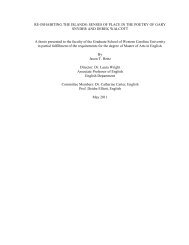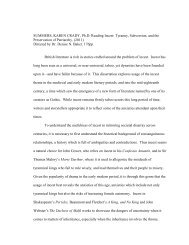Song Character Analysis Worksheet - The University of North ...
Song Character Analysis Worksheet - The University of North ...
Song Character Analysis Worksheet - The University of North ...
Create successful ePaper yourself
Turn your PDF publications into a flip-book with our unique Google optimized e-Paper software.
cannot be composers. His characterization <strong>of</strong> woman is full <strong>of</strong> gender stereotypes regard-<br />
ing her emotional state and mimetic interpretations, her inability to endure disappoint-<br />
ments or opposition (“woman is not calculated to endure”), and her lack <strong>of</strong> facility to<br />
comprehend theory, counterpoint, or form because <strong>of</strong> her innate use <strong>of</strong> intuition rather<br />
than logic or mathematical deduction. Because <strong>of</strong> these gender limitations and societal<br />
expectations, he wrote, “It does not seem that women will ever originate music in its<br />
fullest and grandest harmonic forms. She will always be the recipient and interpreter, but<br />
there is little hope she will be the creator.” 14 One must wonder about Upton’s reaction in<br />
the next decade to the enormously successful Boston premieres <strong>of</strong> Mrs. H. H. A. (Amy)<br />
Beach’s Grand Mass in E-flat Major (1892) and Symphony no. 1, “Gaelic” (1896).<br />
Ethnic women <strong>of</strong> the working-class poor and African-American women did not<br />
enjoy a separate sphere. <strong>The</strong>ir reality was the necessity for mothers and daughters to<br />
work outside <strong>of</strong> the home (or to take in piece-work) for ten to twelve hours a day, six<br />
days a week, just to survive. <strong>The</strong>y then returned home to attend to their own domestic<br />
work. 15 This created a serious source <strong>of</strong> conflict within the home as the husband felt that<br />
it demeaned his own abilities to provide adequately for his family. An increase in<br />
physical abuse and alcoholism became the norm for working-class fathers. 16 Jobs for<br />
women outside <strong>of</strong> the home were always at the lowest rank <strong>of</strong> pay and aptitude, and in<br />
14 Woman in Music, Boston: J. R. Osgood (1880); reprinted in Carol Neuls-Bates, Women in<br />
Music (Boston: <strong>North</strong>eastern <strong>University</strong> Press, 1996), 206-210. Upton was a music critic and editor for the<br />
Chicago Tribune.<br />
15 In the textile industry, specifically, daughters worked to supplement the family income so that<br />
the sons could continue school. <strong>The</strong>y usually left the work force after marriage, but then returned while<br />
raising children to “make ends meet.” Kerber and DeHart, 483.<br />
16 Pleck, 1951.<br />
39

















